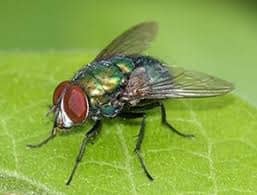House Fly Habits and Habitat

Fly control is always a common concern, since a house fly is capable of transferring more than 100 different pathogens, including salmonella, typhoid, and tuberculosis. House flies contaminate food surfaces by spreading disease organisms picked up on their legs and mouth-parts when feeding on trash, feces and other decaying substances.
With that said, An occasional house fly is not necessarily a problem requiring intervention. Every home, every human, will have to deal with an occasional fly. When we get called out for flies, it is a large population that will not go away.
Like many other pests, the house fly experiences a four-phase life cycle. Depending on conditions, the developmental time of a house fly from egg to adult may require as little as six days. She will reproduce about 5-6 times, laying batches of about 100 eggs during each round. Female house flies usually only mate once, but are capable of producing between 350-900 eggs in their lifetime. Adult house flies typically live 15-25 days.
Since house flies don’t have teeth, they can only feed on liquids. However, they use their sponging mouth-parts to liquefy many solid foods through spitting or regurgitation. Their tongues are shaped like straws to suck up the food. House flies feed on a wide variety of substances such as human food, animal carcasses, and garbage. They are particularly attracted to pet waste because of its strong odor.
HOUSE FLY CONTROL
With our Integrated Pest Management (IPM) practices, we combine multiple control measures to eliminate the problem. Each situation is different, however, it may call for habitat modification, mechanical controls and pesticide.
Since our company originated in Wildlife Expertise, instinctively we would suspect an animal has died in a crawlspace, attic or wall if there is a large fly population. Regardless, we will discuss options with you and devise a plan that meets your goals and expectations.
We deal with other flying nuisance pests like: Fruit Flies, Fungus Gnats, Hornets etc.
